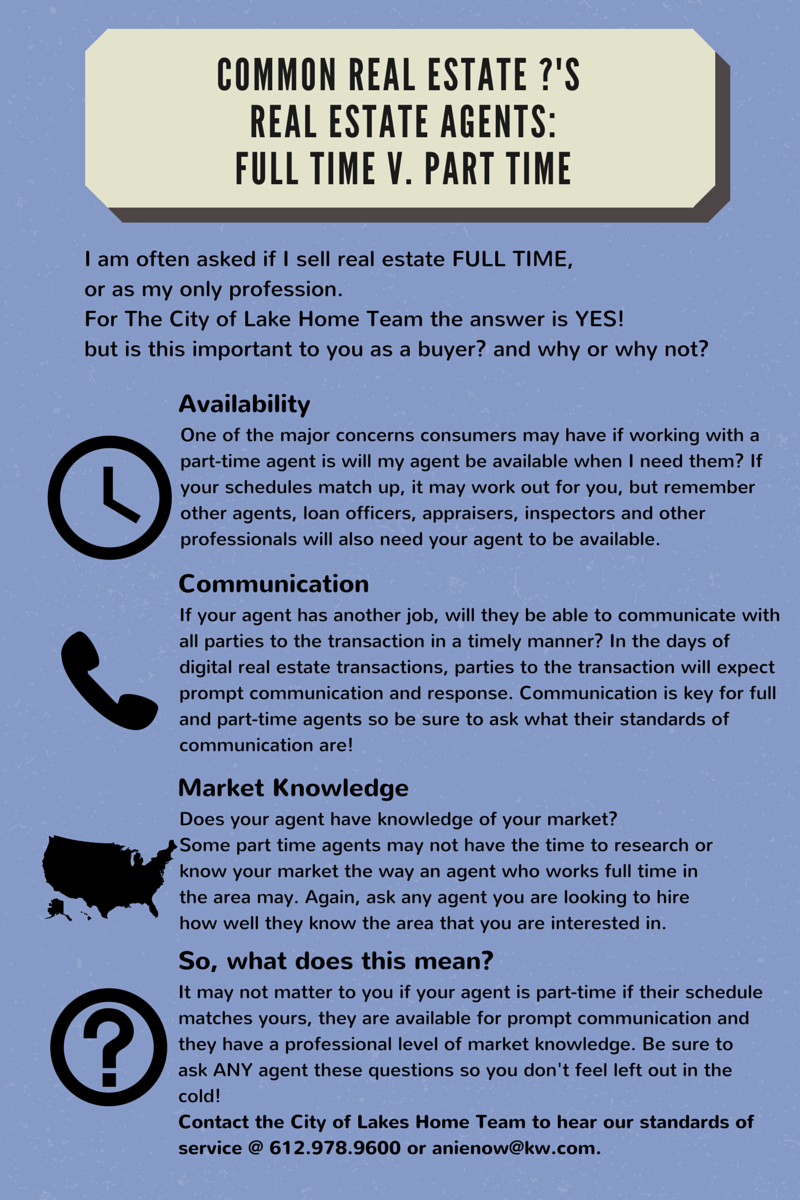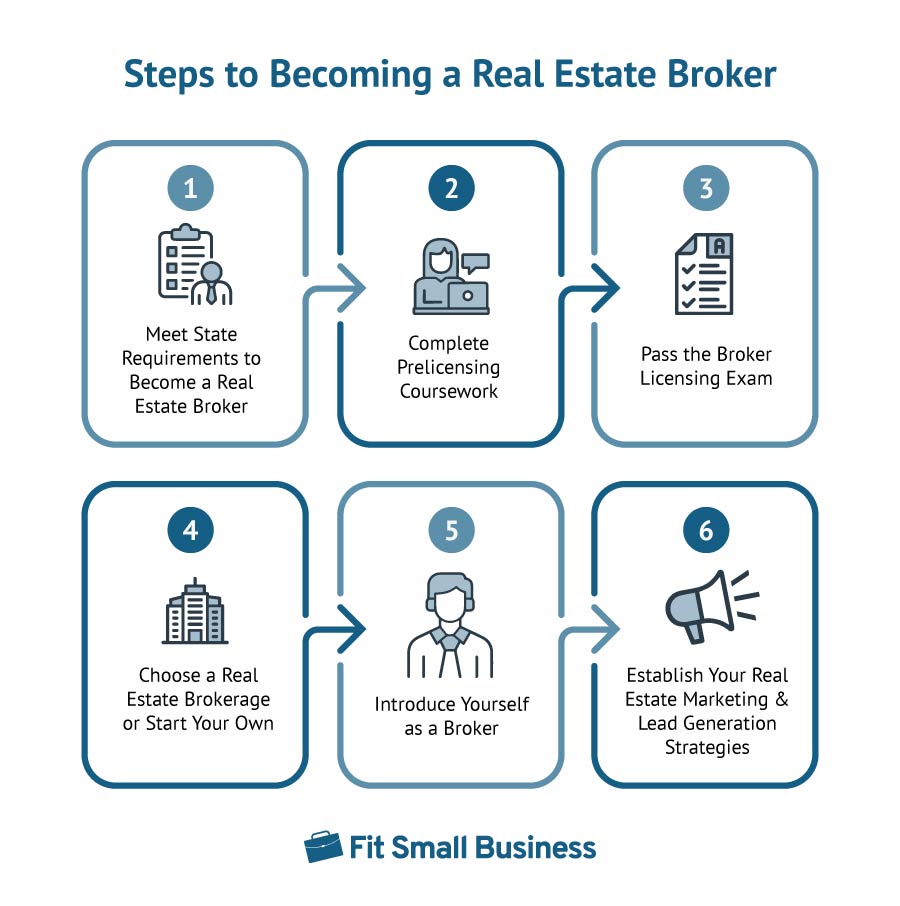
Part-time real estate agents are a great way for you to make a career shift or to start a side business. You can work remotely, make a living, and set your own hours. Part-time work in real estate is a great way to gain the experience that you need to move into a full-time position.
Your commitment is the most important thing when you work as a part-time real estate agent. You must make the time to prospect new leads. This is the lifeblood of any part time real estate career. The more leads that you can generate, the greater your chances of closing deals. You won't be able to establish relationships with clients, or close deals, if you don’t have a constant supply of leads.
This is the best way to avoid these problems. You should always be available to potential clients. You should be honest about your availability. Don't be afraid to tell potential clients that you won't be available for certain times. You never know when a client might need to see a home right away.

In order to become a part time real estate agent, you will need to pass the state and national portions of the licensing exam. Also, you will need to take a pre-licensing program. The required license fees will be paid and you may need a background or fingerprint check.
Before you consider becoming a parttime real estate agent, you need to ensure that the brokerage is right for your needs. This is an important decision. Do your research. It is essential to find a broker with whom you can trust. If you don’t have the right skills, don’t get stuck at a large brokerage.
It can be challenging and frustrating. You will have many responsibilities, including scheduling showings and calling prospective clients. Additionally, you must manage your family's needs as well as other commitments. Your business's health is at stake if you fail to balance your responsibilities.
Part-time real estate careers can be lucrative and rewarding, but you need to be prepared to work hard. This includes taking time to study for the test and taking pre-licensing courses. You will also need the ability to continue with your education. It will not be easy to do so. You need to make your clients feel special.

A licensed agent who works part-time in real estate may need to pay licensing fees. The license fee will vary from state to state. It will cover a pre-licensing class, a test and the licensing exam.
FAQ
What is the average time it takes to get a mortgage approval?
It depends on many factors like credit score, income, type of loan, etc. Generally speaking, it takes around 30 days to get a mortgage approved.
How many times may I refinance my home mortgage?
This depends on whether you are refinancing with another lender or using a mortgage broker. In both cases, you can usually refinance every five years.
How long will it take to sell my house
It all depends upon many factors. These include the condition of the home, whether there are any similar homes on the market, the general demand for homes in the area, and the conditions of the local housing markets. It may take 7 days to 90 or more depending on these factors.
What is a Reverse Mortgage?
A reverse mortgage is a way to borrow money from your home without having to put any equity into the property. It allows you access to your home equity and allow you to live there while drawing down money. There are two types to choose from: government-insured or conventional. Conventional reverse mortgages require you to repay the loan amount plus an origination charge. FHA insurance covers the repayment.
What should I look out for in a mortgage broker
A mortgage broker helps people who don't qualify for traditional mortgages. They work with a variety of lenders to find the best deal. Some brokers charge fees for this service. Others provide free services.
What are the top three factors in buying a home?
The three main factors in any home purchase are location, price, size. Location refers to where you want to live. Price refers how much you're willing or able to pay to purchase the property. Size refers to the space that you need.
Statistics
- Based on your credit scores and other financial details, your lender offers you a 3.5% interest rate on loan. (investopedia.com)
- The FHA sets its desirable debt-to-income ratio at 43%. (fortunebuilders.com)
- When it came to buying a home in 2015, experts predicted that mortgage rates would surpass five percent, yet interest rates remained below four percent. (fortunebuilders.com)
- Private mortgage insurance may be required for conventional loans when the borrower puts less than 20% down.4 FHA loans are mortgage loans issued by private lenders and backed by the federal government. (investopedia.com)
- 10 years ago, homeownership was nearly 70%. (fortunebuilders.com)
External Links
How To
How to Manage A Rental Property
Renting your home can be a great way to make extra money, but there's a lot to think about before you start. These tips will help you manage your rental property and show you the things to consider before renting your home.
If you're considering renting out your home, here's everything you need to know to start.
-
What should I consider first? You need to assess your finances before renting out your home. You may not be financially able to rent out your house to someone else if you have credit card debts or mortgage payments. It is also important to review your budget. If you don't have enough money for your monthly expenses (rental, utilities, and insurance), it may be worth looking into your options. This might be a waste of money.
-
How much will it cost to rent my house? Many factors go into calculating the amount you could charge for letting your home. These include factors such as location, size, condition, and season. Keep in mind that prices will vary depending upon where you live. So don't expect to find the same price everywhere. Rightmove reports that the average monthly market price to rent a one-bedroom flat is around PS1,400. This means that if you rent out your entire home, you'd earn around PS2,800 a year. That's not bad, but if you only wanted to let part of your home, you could probably earn significantly less.
-
Is this worth it? There are always risks when you do something new. However, it can bring in additional income. Be sure to fully understand what you are signing before you sign anything. Renting your home won't just mean spending more time away from your family; you'll also need to keep up with maintenance costs, pay for repairs and keep the place clean. Before signing up, be sure to carefully consider these factors.
-
Is there any benefit? It's clear that renting out your home is expensive. But, you want to look at the potential benefits. There are many reasons to rent your home. You can use it to pay off debt, buy a holiday, save for a rainy-day, or simply to have a break. It's more fun than working every day, regardless of what you choose. If you plan ahead, rent could be your full-time job.
-
How can I find tenants? After you have made the decision to rent your property out, you need to market it properly. Start by listing online using websites like Zoopla and Rightmove. Once potential tenants contact you, you'll need to arrange an interview. This will help you assess their suitability and ensure they're financially stable enough to move into your home.
-
How do I ensure I am covered? You should make sure your home is fully insured against theft, fire, and damage. You'll need to insure your home, which you can do either through your landlord or directly with an insurer. Your landlord will likely require you to add them on as additional insured. This is to ensure that your property is covered for any damages you cause. This does not apply if you are living overseas or if your landlord hasn't been registered with UK insurers. In such cases, you will need to register for an international insurance company.
-
Sometimes it can feel as though you don’t have the money to spend all day looking at tenants, especially if there are no other jobs. You must put your best foot forward when advertising property. You should create a professional-looking website and post ads online, including in local newspapers and magazines. Additionally, you'll need to fill out an application and provide references. Some people prefer to do the job themselves. Others prefer to hire agents that can help. In either case, be prepared to answer any questions that may arise during interviews.
-
What happens after I find my tenant?After you've found a suitable tenant, you'll need to agree on terms. If you have a contract in place, you must inform your tenant of any changes. If this is not possible, you may negotiate the length of your stay, deposit, as well as other details. While you might get paid when the tenancy is over, utilities are still a cost that must be paid.
-
How do I collect my rent? When it comes time for you to collect your rent, check to see if the tenant has paid. If your tenant has not paid, you will need to remind them. After sending them a final statement, you can deduct any outstanding rent payments. You can call the police if you are having trouble getting hold of your tenant. They won't normally evict someone unless there's been a breach of contract, but they can issue a warrant if necessary.
-
How do I avoid problems? You can rent your home out for a good income, but you need to ensure that you are safe. Install smoke alarms, carbon monoxide detectors, and security cameras. You should also check that your neighbors' permissions allow you to leave your property unlocked at night and that you have adequate insurance. Finally, you should never let strangers into your house, even if they say they're moving in next door.